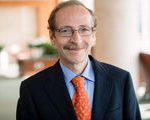Teacher of the Year award for Roberto Cattaneo, Ph.D. — shaping the next generation of virologists
 Roberto Cattaneo, Ph.D. (MMED ’99), came to Mayo Clinic from his native Switzerland in 1999 to start a gene therapy program. “Mayo foresaw that gene therapy would be important in the future, and they sought experts in viruses.” Dr. Cattaneo is an expert in the measles virus. He developed the Mayo Clinic Graduate School of Biomedical Sciences’ Virology and Gene Therapy track — the first in the U.S. — and has been instrumental in training Mayo Ph.D. students in basic virology.
Roberto Cattaneo, Ph.D. (MMED ’99), came to Mayo Clinic from his native Switzerland in 1999 to start a gene therapy program. “Mayo foresaw that gene therapy would be important in the future, and they sought experts in viruses.” Dr. Cattaneo is an expert in the measles virus. He developed the Mayo Clinic Graduate School of Biomedical Sciences’ Virology and Gene Therapy track — the first in the U.S. — and has been instrumental in training Mayo Ph.D. students in basic virology.
Dr. Cattaneo received his first Teacher of the Year award from Mayo Clinic Graduate School of Biomedical Sciences in 2018. “My major success in teaching isn’t this award but, rather, the fact that the graduate school now has a track in virology and gene therapy,” he says. “We were pioneers in this area and, today, students seek us out for this training.”
What does the Teacher of the Year award mean?
It’s like winning a prize. Many others also deserve it.
How do you know when you’ve done a good job teaching?
I’ve done a good job when the graduate school’s Ph.D. students get important position somewhere else and succeed. More immediately, I’ve done a good job when they pass exams or begin to take ownership of projects.
What’s rewarding about teaching?
 The most rewarding part of the job is shaping the next generation of researchers. That is more enduring than papers you write or grants you receive. I also enjoy the daily contact with younger people who devote five years of their lives to basic research.
The most rewarding part of the job is shaping the next generation of researchers. That is more enduring than papers you write or grants you receive. I also enjoy the daily contact with younger people who devote five years of their lives to basic research.
What’s your teaching style?
I try to communicate with the audience as soon as possible and have dialogue. The Socratic style is the best way of teaching.
Who are your teaching role models?
I had a high school biology professor who had a strange ritual of calling out students at the beginning of the hour to answer questions about or summarize the previous hour, so we had to be on our toes. I didn’t like that at the time, but I really learned to love and commit to biology.
At the University of Zurich I had to participate in and present literature seminars twice a week, on Mondays and Fridays from 5 to 6:30 p.m. and departmental meetings on Saturdays from 9:30 a.m. to 12 p.m. The Institute for Molecular Biology director traveled a lot and had many responsibilities, but he was always there, asking questions and leading by example.
Students who nominated you for the Teacher of the Year award commented that you believe that strong work comes from a happy work environment. Can you talk about that?
 I think good Ph.D. students need to be curious, work hard and have fun. The three things go together. So we have parties and do activities together. For example, some in our group enjoy bicycling, so we have biked to local festivals to hear music. We go to Thursdays on First in downtown Rochester for lunch. Fun is an intrinsic part of learning. I have fun because I’m privileged to make a living with my hobby. I love science.
I think good Ph.D. students need to be curious, work hard and have fun. The three things go together. So we have parties and do activities together. For example, some in our group enjoy bicycling, so we have biked to local festivals to hear music. We go to Thursdays on First in downtown Rochester for lunch. Fun is an intrinsic part of learning. I have fun because I’m privileged to make a living with my hobby. I love science.
Student comments
“Dr. Cattaneo always has time for a few minutes of wisdom.”
“He strives to foster ongoing scientific discussions.”
“Dr. Cattaneo is genuinely concerned about the people in his lab and their science, believing that strong work comes from a happy work environment.”